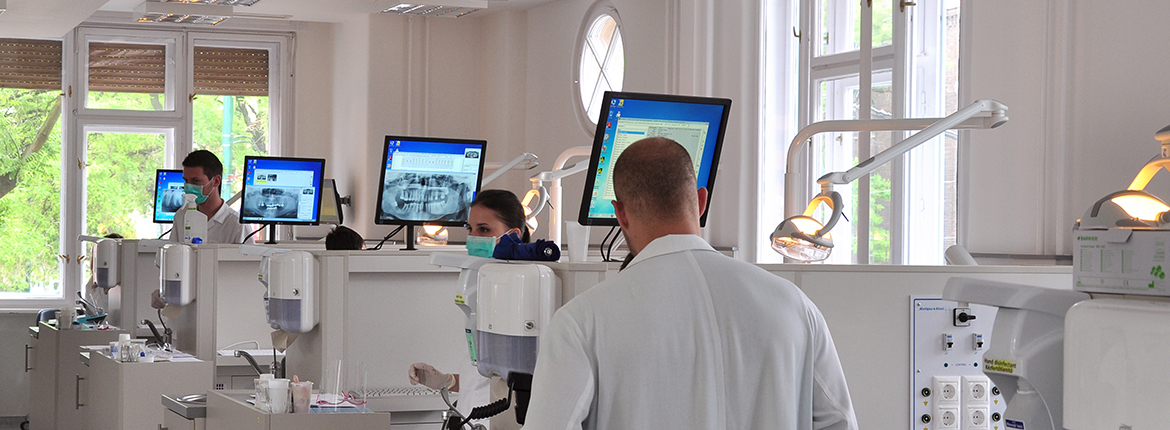
Dental Medicine Training
On training
Training proceeds in the form of regular, uniform, undivided basic training over a period of 5 years. The first two years include the theoretical module, as foreseen by the credit system. During these two years, the students study core subjects such as anatomy, biochemistry, medical biology, physics, physiology, etc. In addition, unlike the curriculum for medical students, our students complete courses in dentistry material science, instrumentation practice, and a basic course in dentistry (odontology). The two semesters in year 3 are dedicated to completing the preclinical module. Aside from pathophysiology and pathology, basic training in dentistry at this level includes restorative dentistry, prosthetic and oral surgery propaedeutics. A part of the practical assignments consists of skill development and, of course, manual training. For example, the various manoeuvres, postures, use of instruments and handling materials that will be applied later on are mastered on phantom heads in the training laboratory. It goes without saying that the students will definitely have mastered all theoretical and practical knowledge necessary to deal with the patient and do the required steps when the first patient enters the practice.
Practical assignments
While there is a summer practice period for the students after the first year of study, which is dedicated to the theory of general nursing, practice in odontotechnology takes place in the training laboratory at the end of the second year. During the summer practice that follows year 3, the students meet patients who they will already treat by themselves. First they deal with cases related to oral surgery. During the next summer the area is further widened to include the preparation of fillings and dentures. In year 4 and year 5, the students develop their skills going through the clinical module, by carrying on with the treatment of patients which started during the summer practice, and achieve a level of proficiency required by the dentist’s profession. Gradually, the students perform work more and more independently in the course of clinical practice, and further develop their skills and acquire knowledge and experience under continuous professional supervision.
Diploma
We are proud that the Dentistry School of Szeged has been well known for decades for its highly trained graduates who are sought after throughout Hungary and Europe. Equipped with the diploma and the knowledge obtained here, our students will easily find a placement on the first day after the diploma award ceremony in any country of the European Union. Luckily, they can establish existential wealth and prosperity also in Hungary. With the diploma in their hands, our students can pursue further specialized studies in areas like periodontology, orthodontics, conservative dentistry and prosthetic dentistry, children’s dentistry, and oral surgery. These days, a dentist’s diploma grants education offering health and prosperity in both the state sector and private practice.
Entry Requirements
1. Applicants are required to be over the age of 18 in the year of application (by December 31).
2. Applications are accepted from graduates of accredited high schools or colleges/universities. According to the decision of the Admission Committee of the Faculty of Dentistry of the University of Szeged, students who have failed any subject in the final year of their high school studies are not entitled to apply to our programs.
3. You are also eligible to complete your online application and sit for an entrance examination if you are in your final year but have not received your School Leaving Certificate or Diploma yet. In this case, you must present proof that you are attending high school.
4. Applicants are required to sit for an entrance examination. Entrance examinations are held in Hungary and abroad. The applicants are allowed to participate in a maximum of two examinations during one application period if the chance is offered by the University of Szeged.
5. Holders of the following degrees can be exempted from sitting for the entrance examination:
GCE A2 levels
Students are required to achieve grade A in three natural science subjects
(Biology, Chemistry, Physics or Mathematics) and English language
GCE AS level grades are not considered to meet university requirements.
IB Diploma program
Students are required to achieve a grade 5 in two natural science subjects
(Biology, Chemistry, Physics or Mathematics) and English language.
BSc Degree Programs
First Class Honours Bachelor of Science Degree in Natural, Biomedical, Life Sciences, Chemistry,
Biology and Physics and Dental Hygiene if studies were pursued in English language.
Transfer from other universities
Students who have successfully pursued dental medicine studies in English language at other accredited universities can apply for admission without being obliged to take an entrance examination.
Preconditions of transfer are set by the Faculty of Dentistry.
For details please read the Academic Regulations of the Faculty of Dentistry here.
Admission to an upper year might be possible if subjects of previous studies identical or similar (at least 75%) to the curriculum of the University of Szeged are approved.
Please note that at least 50 per cent (%) of the student’s complete dental medicine studies must be fulfilled at the University of Szeged.
Detailed information on the relevant curriculum and the study plans is available here.
Students might also be subject to sit for evaluation examinations. Evaluation exams are held only in Szeged, Hungary. Detailed information about exam(s) registration will be sent to the applicant via e-mail after applicants submit their application online. (Evaluation examination fee is included in the application fee.)
Credit transfer request form for transfer students can be downloaded here.
Master Training in Dentistry
uniform, undivided form of training
Output training requirements:
The objective of master training and the professional competencies to be acquired:
The objective of training is to prepare dentists equipped with the required physician’s perspective and attitude, acquired on the basis of absorbed knowledge and mastered skills, and with the ability to individually pursue a career as a dentist who, while taking part in health care activities, respects human diversity, dignity, people’s rights, and acts and makes decisions bearing these aspects in mind. Such students will undertake to perform individual dentist’s activities in the specialist area corresponding to their proficiency documented by successful specialist examination upon completion of the relevant specialist training program; armed with appropriate theoretical knowledge and practical skills, they qualify for participation in the doctoral training programme.
a) Graduates of the master training programme will be familiar with:
- the fundamental issues of the protection of health of the individual and the society,
- the causes, symptoms, prevention, and treatment of frequently occurring harms pertaining to occupational safety
- the tasks related to the prevention, diagnostics, therapy, and rehabilitation of diseases connected to dentistry, the concept and criteria of maintaining healthiness,
- the essence of major advanced dental diagnostic procedures and methods, the information expected to be derived from them, the indications, contraindications, risks, and diagnostic value of examinations, the symptoms of dental and oral diseases, the oral symptoms of frequently occurring common diseases,
- the aethio-pathogenesis of major oral diseases and frequently occurring common diseases displaying oral symptoms, their early diagnostics and opportunities and methods related to their therapy,
- the system of dental oral surgery screening tests, with special view to oncology-related prevention,
- the essence of major advanced dental therapy procedures, their theoretical and practical foundations, the expected outcome and side effects of these therapeutic procedures,
- the materials applied in dentistry, along with their main characteristics, indications and contraindications pertaining to their application,
- the opportunities and methods related to oral rehabilitation,
- the aethio-pathogenesis of prominent harms to public health and their elimination,
- the principle of dental infection control, the need for, and opportunities of, its practical application,
- the indications and associated risks of oral surgeries and maxillofacial surgeries,
- the psychological and sociological considerations underlying the diseases occurring in dental practice,
- the system of health insurance and the organization of health service, including the system of dentist’s/dental service and the provisions related to its financing, the ethical and legal issues related to the dentist’s practice,
- the financial aspects of health care.
b) Graduates of the master training programme will be able to:
- take a professional dental history of the person concerned and his environment,
- establish whether the condition of the person being examined meets the requirements of healthiness from a dentist’s perspective, whether there are unhealthy features in his behaviour and life style and how pathological disorders are characterized,
- prepare a professional description of the disorder and maintain documentation,
- make decisions on the need for a dentist’s intervention, referral to a physician, a specialist, or on taking other measures,
- apply the method of stomatological prevention in basic care and health education of the population,
- establish appropriate cooperation with teams,
- supervise dental technicians’ jobs and evaluate ready-made dentures,
- apply and evaluate clinical and instrumental testing methods necessary for the dentist’s job, and draw correct conclusions from the related examinations,
- recognize diseases that require immediate dentist’s intervention,
- perform life-saving procedures as part of medical first aid,
- handle devices and instruments used in dental care, be familiar with their accident prevention and labour safety rules.
c) Personal competences and skills required to exercise professional qualification:
- empathy and willingness to help,
- appropriate skills to communicate (with patients, the team, the society),
- appropriate manual skills,
- positive attitude toward professional further training,
- readiness to cooperate, ability to perform managerial tasks after a period of acquiring sufficient practice,
- creativity,
- good problem solving skills.







